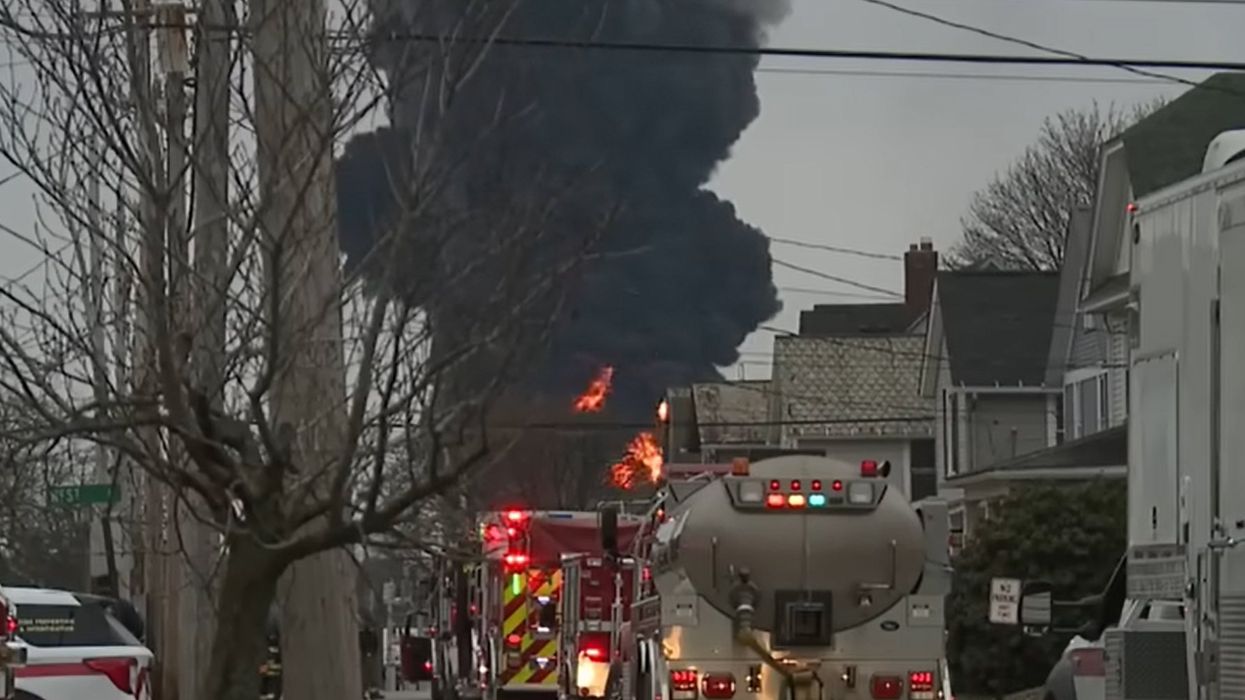
Image source: YouTube video, WKBN - Screenshot

Pennsylvania Gov. Josh Shapiro (D) suggested in a biting letter Tuesday that Norfolk Southern may have had options available to it other than conducting a so-called "controlled" burn of a dangerous carcinogen in the aftermath of the Feb. 3 derailment in East Palestine, Ohio, right on the border of his state.
Extra to accusing Norfolk Southern of needlessly generating confusion and possibly exacerbating the problem, Shapiro implied that the rail company may have rushed the process in order to reopen the rail line.
Shapiro's claims come amid growing tensions and concerns about what precisely was done in response to the derailment and toxic leaks and what the fallout may ultimately be in terms of health and financial impacts.
In his Feb. 14 letter to Alan Shaw, president and chief executive of the Norfolk Southern Corporation, Shapiro indicated that various elected leaders and emergency management officials in Beaver County and the surrounding area — reportedly impacted to a significant extent by the ecological disaster — are concerned "about Norfolk Southern's poor handling of this incident."
Shapiro noted that the Pennsylvania Department of Environmental Protection and the state's emergency management agency "were not immediately contacted by Norfolk Southern" after the incident. However, upon learning of the incident independently, the DEP and PEMA reportedly began monitoring for impacts to the residents, businesses, and environment in the state.
The agencies found that there were at least three major issues with the rail company's "management of the response that put the safety of our first responders and residents at significant risk":
Perhaps more consequential was the rail company's alleged provision of inaccurate information, again imperiling planning, remediation, and protection efforts.
Shapiro claimed that Norfolk Southern "failed to notify state and local response agencies initially of their intention to vent and burn all five cars containing vinyl chloride, rather than just the single car Norfolk Southern personnel identified originally."
The governor further suggested that this failure to communicate critical information about the affected rail cars, their content, and the company's intention to expedite their combustion "led to confusion and wide variability in potentially affected population estimates in downwind plume impacting the Commonwealth."
TheBlaze previously reported that the thick column of smoke that Norfolk Southern personnel helped send skyward contained fumes from the toxic chemicals stored in the wrecked cars, such as vinyl chloride, hydrogen chloride, ethylene glycol monobutyl ether, ethylhexyl acrylate, isobutylene, and phosgene — a gas used for mass slaughter in the trenches during World War I.
Early reports indicated that the reasoning behind the controlled release of the deadly chemicals was to prevent a "catastrophic tanker failure," which allegedly could have resulted in a massive explosion, throwing fumes and shrapnel a far distance. However, the Pennsylvania governor implied in his letter that there were other options available that the rail company apparently discounted or failed to consider.
"Norfolk Southern failed to explore all potential courses of action, including some that may have kept the rail line closed longer but could have resulted in a safer overall approach for first responders, residents, and the environment," wrote Shapiro.
Silverado Caggiano, a hazardous materials specialist, told WKBN, "We basically nuked a town with chemicals so we could get a railroad open."
At the time of the so-called controlled breach, villagers within a one-mile radius of the wreck were cautioned by Ohio Gov. Mike DeWine (R) and Shapiro (D) that remaining in the impacted area could put them in "grave danger of death" and were subsequently evacuated.
DeWine called it "absurd" that Norfolk Southern was not required to notify local officials about the train's contents before it came through, reported the New York Times. DeWine has also called for congressional and possible legal action in the event that the company fails to pay for the cleanup.
Responding to Shapiro's letter, a spokesman for the rail company told Yahoo News, "Norfolk Southern was on-scene immediately following the derailment and began working directly with local, state, and federal officials as they arrived at the unified command established in East Palestine by local officials, including those from Pennsylvania. ... We remain at the command post today working alongside those agencies to keep information flowing from our teams working at the site."
In its response, the company added it was "committed to ensuring health and safety through ongoing environmental monitoring and support for their needs."
Shapiro underscored that he intends to help the Pennsylvania Public Utility Commission "facilitate holding [Norfolk Southern] accountable to Pennsylvanians."
Shapiro penned his letter after the EPA sent Norfolk Southern a general notice of potential liability over the weekend, outlining EPA cleanup actions and the possibility that the railway will have to foot the bill.
TheBlaze reported earlier that residents are now especially concerned about possible water contamination, granted that schools of fish have been spotted floating belly-up down nearby streams and rivers.
The Ohio EPA conducted an assessment in 2019 that found East Palestine's source of drinking water has a "high susceptibility to contamination" because of a lack of clay helping protect the aquifer and "the presence of significant potential contaminant sources in the protection area."
The assessment notes, "This susceptibility means that under currently existing conditions, the likelihood of the aquifer becoming contaminated is relatively high."
WKBN reported that the EPA recently castigated Norfolk Southern for simply covering up contaminated soil in the aftermath of the derailment.
"Five railcar tankers of vinyl chloride were intentionally breached; the vinyl chloride was diverted to an excavated trench and then burned off. Areas of contaminated soil and free liquids were observed and potentially covered and/or filled during reconstruction of the rail line including portions of the trench/burn pit that was used for the open burn off of vinyl chloride," said the letter.
Like Blaze News? Bypass the censors, sign up for our newsletters, and get stories like this direct to your inbox. Sign up here!
Thick smoke, flames seen as controlled release of chemicals begins at East Palestine train siteyoutu.be